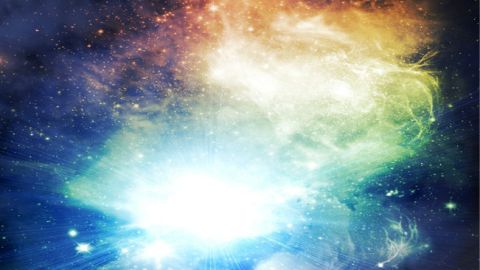Michio Kaku: The Energy of the Future

What’s the Big Idea?
“We are children when we talk about the cosmic scale of energies throughout the entire universe,” says theoretical physicist Michio Kaku. But with a little (okay, a lot) of human ingenuity, we may one day have the ability to harness the energy of the stars.
Watch here:
To convey the broadness and wideness of the possibilities, Dr. Kaku points to the Kardashev Scaledeveloped by Soviet astrophysicist Nikolai Kardashev. The scale, while purely theoretical, puts forward a basic framework for evaluating the technological advancement of any civilization from a cosmic perspective. (Kardashev, for the record, predicts that the universe will live infinitely long and with infinite variety.)
The scale starts at Type I and progresses all the way to Type III, which is about 10-100 billion times more powerful than a Type II civilization:
So where does contemporary human civilization fall? Easy, says Dr. Kaku. We’re type zero. Using dead plants and organisms to power machines is a comparatively archaic form of fueling our world. But there’s hope: each year, the planet generates 3% more power than the one before, which puts us only about 100 years away from becoming a Type I and a 1,000 years away from being a Type II civilization. “In about 100 years time, the energy output of the earth will be comparable to the total amount of sunlight that hits the earth itself,” he adds.
What’s the Significance?
That is the point at which reasonable hypothesizing ends and imagination begins. Beyond the Kardashev Scale, Kaku speculates, extragalactic power awaits. A “Type IV” civilization would be able to look beyond our galaxy, unlocking the potent and mysterious force of dark energy. For, while stars make up 4% of the matter of the universe, 23% of the universe is comprised of dark matter, and 73%, dark energy.
The modernist bard e.e. cummings once wrote, “This is the wonder that’s keeping the stars apart.” Reality, it turns out, may be just as lyrical as verse. “The evolution of the universe itself, we think, is driven by… dark energy,” says Dr. Kaku. “This invisible energy… pulls the galaxies apart, creates the expanding universe. In the far future, perhaps when we harness extragalactic energy – dark energy – we can [then] harness the energy of the Big Bang itself.”
Tell us: what do you think? How will our world be powered in the future? Will we ever harness the energy of the Big Bang?
Image courtesy of Shutterstock





